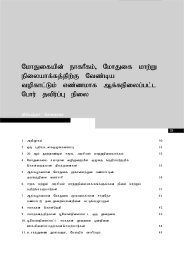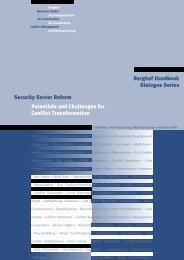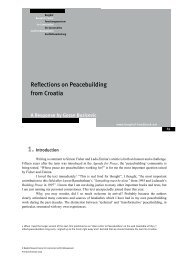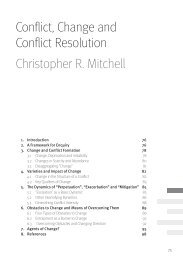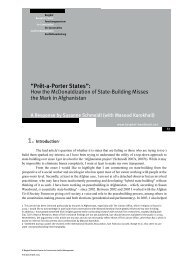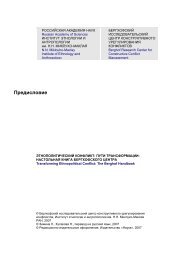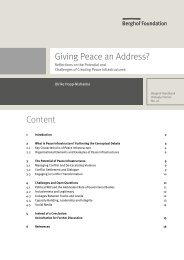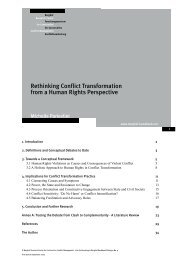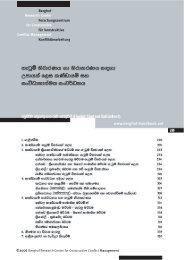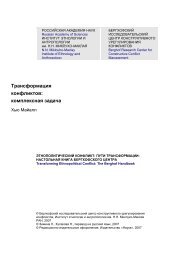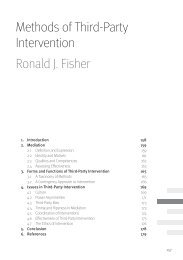Human rights and conflict transformation: The challenges of just peace
Human rights and conflict transformation: The challenges of just peace
Human rights and conflict transformation: The challenges of just peace
You also want an ePaper? Increase the reach of your titles
YUMPU automatically turns print PDFs into web optimized ePapers that Google loves.
6<br />
Bergh<strong>of</strong> H<strong>and</strong>book Dialogue No. 9<br />
emerged much more recently in the academic <strong>and</strong> policy arenas, their short history has been marked<br />
by numerous controversies <strong>and</strong> debates, leading to the formation <strong>of</strong> contending schools <strong>of</strong> thought.<br />
Such debates have revolved primarily around the origins <strong>and</strong> causes <strong>of</strong> <strong>conflict</strong> (e.g. agency-based<br />
or structural approaches); the dynamics <strong>of</strong> <strong>conflict</strong> escalation <strong>and</strong> de-escalation (e.g. linear, circular<br />
or systemic); the mechanisms <strong>and</strong> outcomes <strong>of</strong> <strong>conflict</strong> management (negative or positive <strong>peace</strong>,<br />
top-down <strong>and</strong> bottom-up approaches); <strong>and</strong>, finally, the ethics <strong>and</strong> strategy <strong>of</strong> third-party intervention<br />
(s<strong>of</strong>t-h<strong>and</strong>ed or power-based mediation, prescriptive or ‘elicitive’ approaches, etc).<br />
With all their history, both fields are now firmly on the international agenda. <strong>Human</strong><br />
<strong>rights</strong> have become an “institutionalised part <strong>of</strong> international politics” 2 , strengthened by the recent<br />
International Tribunals for the Former Yugoslavia <strong>and</strong> for Rw<strong>and</strong>a, the establishment <strong>of</strong> the<br />
International Criminal Court <strong>and</strong> the global transitional <strong>just</strong>ice movement. At the same time, <strong>conflict</strong><br />
resolution <strong>and</strong> <strong>transformation</strong> initiatives <strong>and</strong> rhetoric – including a strong emphasis on dealing with<br />
the past <strong>and</strong> reconciliation – are prevalent in local, national <strong>and</strong> international responses to armed<br />
<strong>conflict</strong>. <strong>The</strong> vast majority <strong>of</strong> contemporary armed <strong>conflict</strong>s have been resolved through negotiated<br />
settlements, <strong>of</strong>ten with active support from international diplomats, pr<strong>of</strong>essional facilitators or<br />
insider mediators. With the realization that nearly one third <strong>of</strong> settled <strong>conflict</strong>s relapse into violent<br />
warfare within five years, 3 post-war <strong>peace</strong> consolidation programmes aimed at demilitarising,<br />
democratising, developing <strong>and</strong> reconciling these countries have become essential components <strong>of</strong><br />
international intervention <strong>and</strong> are now firmly placed on the UN, EU <strong>and</strong> World Bank agendas.<br />
Given the growing emphasis on comprehensive transitional <strong>just</strong>ice <strong>and</strong> reconciliation<br />
processes, the overlap between the fields is becoming larger, <strong>and</strong> the implementation <strong>and</strong> process<br />
management <strong>of</strong> “<strong>peace</strong> with <strong>just</strong>ice” are now emerging as the main <strong>challenges</strong>. Despite all the tension<br />
portrayed above, many analysts <strong>and</strong> commentators also detect a strong common calling among what<br />
Peter Uvin calls the “communit[ies] <strong>of</strong> principled social change” 4 , made up <strong>of</strong> development workers,<br />
human <strong>rights</strong> activists <strong>and</strong> <strong>conflict</strong> <strong>transformation</strong> / <strong>peace</strong>building practitioners. This common calling<br />
is a dedication to building structures <strong>and</strong> communities that do <strong>just</strong>ice to the needs <strong>and</strong> potential <strong>of</strong><br />
every human being that is part <strong>of</strong> them.<br />
In this Dialogue, we are hence aiming to go beyond the divide to explore how the<br />
two approaches could become mutually enforcing <strong>and</strong> enriching rather than work in isolation or<br />
competition. We do not have the ambition <strong>of</strong> resolving all dilemmas <strong>and</strong> trade-<strong>of</strong>fs – these will persist<br />
in the political realities in which both human <strong>rights</strong> <strong>and</strong> <strong>conflict</strong> <strong>transformation</strong> work are carried out.<br />
Rather, we enter the Dialogue with the vision <strong>of</strong> gaining a clearer underst<strong>and</strong>ing <strong>of</strong> the potential – <strong>and</strong><br />
limits – <strong>of</strong> bringing together human <strong>rights</strong> <strong>and</strong> <strong>conflict</strong> <strong>transformation</strong> in specific contexts.<br />
Michelle Parlevliet contributes the lead article to the Dialogue, on which in the following<br />
six comments are based. Parlevliet has been working on the nexus <strong>of</strong> human <strong>rights</strong> <strong>and</strong> <strong>peace</strong> work<br />
for nearly 15 years in various capacities <strong>and</strong> contexts. Most recently, she completed a posting as<br />
senior <strong>conflict</strong> <strong>transformation</strong> advisor for Danida’s <strong>Human</strong> Rights <strong>and</strong> Good Governance Programme<br />
in Nepal. She has previously worked with the Centre <strong>of</strong> Conflict Resolution in South Africa, the<br />
South African Truth <strong>and</strong> Reconciliation Commission <strong>and</strong> the International Criminal Tribunal for the<br />
Former Yugoslavia.<br />
2 Emily Pia/Thomas Diez 2007, Conflict <strong>and</strong> <strong>Human</strong> Rights: A <strong>The</strong>oretical Framework, SHUR Working Paper Series 1/07, 13.<br />
3 <strong>Human</strong> Security Center 2008, <strong>Human</strong> Security Brief 2007. Vancouver, Simon Fraser University, 37.<br />
4 Peter Uvin 2004, <strong>Human</strong> Rights <strong>and</strong> Development. Bloomfield, CT: Kumarian Press, 4.






